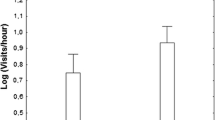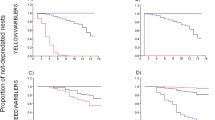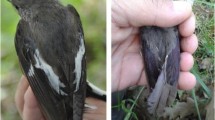Abstract
According to indicator models of sexual selection, females can benefit from choosing males with above average epigamic traits, but empirical evidence for such benefits is scarce. Here, we report results from an experiment with 29 pairs of house sparrows (Passer domesticus) where the intensity of nest defense against a mounted mustelid predator was related to the size of the black throat and breast patch (“badge”) in males. Using principal components analysis (PCA), original response variables of both sexes were reduced to two factors: “Approach” to the predator and “Distant warning”. “Approach”, the more risky behavior, increased from small- through medium- to large-badged males and decreased in their females. Since large-badged males have a higher certainty of paternity (i.e. greater benefits from defense) and may be older and more experienced (i.e. incur lower costs), the most likely explanation for male defense intensity increasing with badge size is an improving benefit/cost ratio. The resulting optimal response of their females and evolutionarily stable participation in joint parental care is illustrated by a graphical model. It shows that females would, indeed, benefit directly from choosing large-badged males. This, however, is no proof of a direct evolutionary tie between badge size and paternal behavior, as assumed by indicator models of sexual selection. It may simply represent a spurious relationship, originating from the correlation of badge size and defense with confidence of paternity.
Similar content being viewed by others
Author information
Authors and Affiliations
Additional information
Received: 22 September 1997 / Accepted after revision: 3 November 1997
Rights and permissions
About this article
Cite this article
Reyer, HU., Fischer, W., Steck, P. et al. Sex-specific nest defense in house sparrows (Passer domesticus) varies with badge size of males. Behav Ecol Sociobiol 42, 93–99 (1998). https://doi.org/10.1007/s002650050416
Issue Date:
DOI: https://doi.org/10.1007/s002650050416




